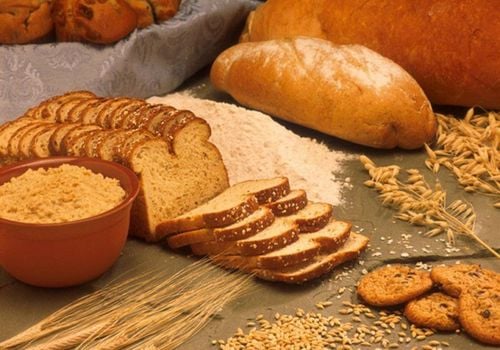This is an automatically translated article.
Cheese belongs to the group of foods with high nutritional content with the main nutritional components being protein, lipid and calcium. These nutrients provide the body with healthy growth. Although cheese has many advantages, is it good for children to eat a lot of cheese? This article will discuss this issue further.1. Cheese
Cheese belongs to the group of processed dairy foods that are concentrated, so the protein and fat content, especially calcium, is very high. Therefore, if children eat cheese, it will help supplement this source of nutrients effectively. Moreover, the composition of cheese does not contain sugar, so children who are lactose intolerant can still use cheese to provide nutrients for the body more effectively.Although cheese has many wonderful properties, it is not for that reason that you should choose to only feed your baby cheese and forget about other foods. Because that will not balance the nutritional content. Because the nutritional composition of cheese mainly includes protein, carbs, fat, calcium, it does not have all the vitamins and minerals needed by the body. So, it is advisable to only choose cheese for your baby as a snack or it can be combined with other foods such as spread on bread, mixed into porridge... to both add energy and ingredients. nutritional deficiencies such as vitamins and minerals from other food sources.
Cheese and other dairy foods are good sources of calcium and protein. But you may be wondering if you should limit cheese in your child's diet.
The amount of cheese given to children may depend on age, weight... For children whose weight exceeds the norm, the addition of cheese to the diet may not be necessary. Normally, children with normal growth should only eat 1-2 cheese bars per day.
So, is it good for children to eat a lot of cheese? Children should not eat too much cheese, especially the selection period for children to eat cheese should not be long. Because, it may cause children related health effects. If you want to supplement your baby's daily calcium content, you can choose other calcium-rich foods such as: Crab, field shrimp...

Mẹ không nên cho trẻ ăn phô mai quá nhiều
2. Misunderstandings when using cheese in children's diets
Many Vietnamese people think that milk and dairy products such as cheese should be for young children, the elderly, and the sick. However, this view is opposite to that of developed countries when thinking about dairy products. Dairy products in developed countries are always recommended to provide calcium as well as other nutrients for the body.Milk is still in the food group that is more accessible to consumers. Cheese, on the other hand, can be partly explained because there is no habit of using cheese or it may also be due to a lack of understanding of the nature of cheese. To clarify this, it can be seen that cheese is derived from milk, which is concentrated, so the content of nutrients in cheese accounts for a very high proportion, especially including protein, fat, and calcium. .. Moreover, cheese does not contain sugar, so for children who cannot tolerate lactose, cheese can be classified as a product capable of replacing milk for this audience. Moreover, cheese contains mainly casein, a type of protein that makes it easier for children to digest.
Many people are afraid that using too much cheese can cause obesity. But this is completely unproven. Cheese is ranked as one of the top favorite foods in developed countries around the world. This type of food is also proven to be extremely good for the health of the user along with the addition of calcium, vitamin A, and B vitamins necessary for the body to use. Moreover, the taste of cheese is quite delicious, along with the ability to create diverse menus for meals every day. Forming the habit of eating cheese will become an integral part of a healthy daily menu.
In the case of obese people, you can eat cheese with reduced fat content in the product to provide enough protein, calcium, minerals as well as essential vitamins for the body.
The calcium content in cheese is 6 times higher than the calcium content in milk, and the composition of cheese also contains vitamin D, which is good for calcium absorption into the bones. In addition, cheese also helps the health of teeth because it will create alkali, help reduce acidity in the mouth and work to prevent tooth decay.
3. Giving children a lot of cheese may be linked to constipation
A diagnosis of constipation usually means that your child has hard, hard-to-pass stools that can also be painful. Some children will have fewer than three bowel movements a week and others will have small bowel movements frequently throughout the day.Nutritionists say that eating too much cheese, bananas, rice or milk can all cause problems. Therefore, a diet low in fiber, water, and other fluids can be offered.
Other factors that can also play a role in causing constipation include stress, the child's age and other behaviors.
According to experts: Children often get constipated because they suck in feces. They can experience this condition for many reasons, including: Stress ; Physical difficulty in using the toilet...

Bé ăn phô mai nhiều có thể làm tăng nguy cơ bị táo bón
Reduces the factors that can cause constipation when using cheese. Usually, nutritionists will start by assessing a child's diet, asking what foods and how much children usually eat. Your doctor can then recommend adjustments. For example, if a child is eating more than 340 grams of cheese a day, they may recommend reducing that number to 113 or 141 grams and limiting other dairy products.
Increase foods that can fight constipation. Dietitians recommend eating more foods that can help minimize the problem. Some suggestions include adding fiber-rich foods like vegetables, fruits (especially apples with the skin on), whole grains, legumes, and beans.
Exclude other possible factors. Reviewing medications and checking for health problems like irritable bowel syndrome help detect or rule out other possible causes of constipation. This helps to find a diet that is right for your child and to correct any behaviors or obstacles that may be causing constipation problems in your child.
Please dial HOTLINE for more information or register for an appointment HERE. Download MyVinmec app to make appointments faster and to manage your bookings easily.
Reference source: health.clevelandclinic.org












